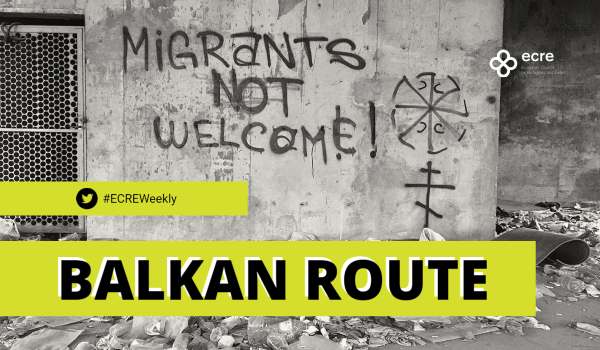Border Violence Monitoring Network’s (BVMN) latest regional update and a joint report by collectives in Serbia points to ongoing systematic violence towards people on the move across the Balkans. The Council of the EU gives the green light for the European Border and Coast Guard Agency (Frontex) to provide “support” to North Macedonia on “border management”. 18 Afghans were found dead in Bulgaria in an abandoned truck due to suffocation in a tragedy linked to human smuggling.
The Border Violence Monitoring Network (BVMN) published its regional report for the month of January, sharing 18 testimonies of pushbacks impacting 172 people on the move (POM) across the Balkans and Greece. Grassroot organisations working on the ground reported trends of systematic violence towards people on the move including the involvement of foreign officers mainly from Austria, Czech Republic and Slovakia in pushbacks along the Serbian-Hungarian border, pushbacks from Bosnia-Herzegovina to Serbia. Further BVMN reported an increase in pushbacks from Croatia to Bosnia-Herzegovina as well as reports of people drowning while crossing rivers in Bosnia-Herzegovina.
A joint report published by Medical Volunteers, Collective Aid and Construct Solidarity on the situation in Northern Serbia reports an increase of repression against people on the move by both border and domestic authorities amid ongoing violence on the Hungarian and Romanian borders. The report also notes enhanced cooperation between Serbia and Hungary to facilitate pushbacks, “control migration” and implement “routine evictions of informal settlements which often leaves shelter destroyed, belongings stolen, and people forcibly relocated to camps”. Besides, “the heightening of the Hungarian-Serbian border fence and the abolition of visa-free regime for certain countries from which many displaced people come from are only the beginning of Serbia’s commitment to appease the EU in order to gain EU membership”, leading to more normalisation of violence towards people on the move in Serbia. Additionally, Frach Collective shared testimonies of migrants who survived the physical violence that is becoming a “brutal normality” at the Hungarian border”: “During pushbacks, police use violence, including beatings and dog attacks, or leave people in the cold for hours”, adding that “police took essential medication, like insulin, from them (migrants) during pushbacks”. Meanwhile, Hungary’s state-sponsored media launched a smear again against Andras Lederer, Head of Advocacy at ECRE member Helsinki Hungarian Committee (HHC) for unveiling rule of law violations in the country. Mary Lawlor, UN Special Rapporteur on Human Rights Defenders (HRDs), denounced the defamation campaign against Lederer saying “This is the latest in a series of attempts to discredit civil society in Hungary”. Lederer responded: “It is very reassuring to know that Mary Lawlor follows what seems to be renewed, orchestrated attacks against independent civil society organisations, and in particular HRDs, in Hungary. Regardless of attempts to frighten, smear us into silence, we continue our work”.
Meanwhile, the Council of the EU concluded an agreement on joint cooperation between North Macedonia and Frontex amid an ongoing expansion of the agency’s presence in third countries with migratory routes. This agreement will allow Frontex to provide operational support on the “border management” of North Macedonia, “with full respect for fundamental rights” including access to asylum procedures and human dignity with particular attention to vulnerable groups. “As of 1st April, Frontex will be able to assist North Macedonia in its efforts to manage migratory flows, counter illegal immigration, and tackle cross-border crime”, a press release by the Council of EU states, adding that “Reinforcing controls along North Macedonia’s borders will contribute to further enhancing security at the EU’s external borders”. ECRE stated in response: “Counter “Illegal immigration” – that would then exclude asylum seekers? Tackle “cross-border crime” – that would then include Pushbacks..?”
18 Afghan migrants and refugees were found dead inside an abandoned truck in Bulgaria near the capital Sofia on 18 February. The truck had been transporting a total of 52 Afghans, that had arrived from Turkey and were heading towards Western Europe via Serbia hiding under wooden planks and packed “like in a tin can”. The tragedy marks “the deadliest incident linked to people smuggling in Bulgaria”. The 18 victims died from suffocation. Hristo Krastev, a spokesman for the Sofia Public Prosecutor’s Office, told media that the six Bulgarians, including the alleged ringleader of the smuggling group, have been caught in relation to the incident and might face up to 15 years in prison if convicted on charges of involuntary manslaughter and participating in organised crime and people smuggling.
The Foundation for Access to Rights (FAR) won a strategic case appealed before the Supreme Administrative Court (SAC) to restore the provision of food to Ukrainian refugees in Bulgaria. The final instance given on the case by a panel of five judges confirmed the end of the implementation of the decision of the Council of Ministers, on the basis of which the Ukrainian refugees were accommodated in the transit center under the Ministry of the Interior in Elhovo and the provision of food was abruptly terminated, without alternative. The organisation states: “In the provisional determination the SAC agreed with FAR’s argument that the measures in the Council of Ministers’ decision create a real danger that the people who are left without food would suffer significant and irreparable harm. In the final review the Court determines that “although organizations such as the Bulgarian Red Cross and Caritas support the state in securing food, it cannot be accepted that the cancellation of the main mechanism does not endanger refugees”.
For further information:
- ECRE, Balkan Route: Arrivals to EU Up – Pushbacks and Violations Continue, ECtHR Rulings Against Hungary and Croatia, February 2023
- ECRE, Balkan Route: Commission’s Plan Focus on Returns, Reports of Pushbacks Continue Amid Investigations Highlighting Systematic Violence, EU Admits Croatia to Schengen Without Regard to Abuses at the Border, December 2023
This article appeared in the ECRE Weekly Bulletin. You can subscribe to the Weekly Bulletin here.

